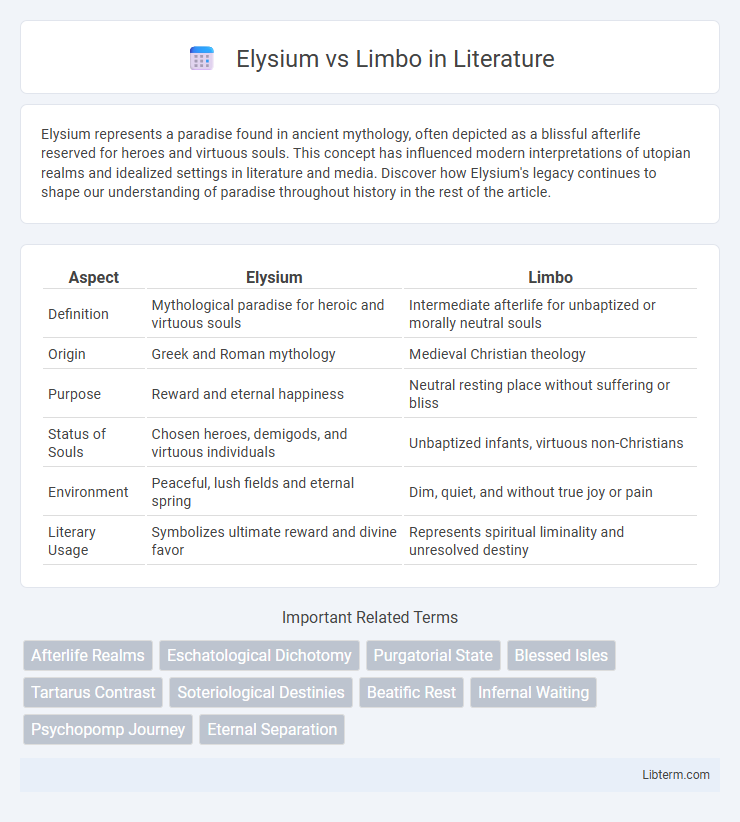Elysium represents a paradise found in ancient mythology, often depicted as a blissful afterlife reserved for heroes and virtuous souls. This concept has influenced modern interpretations of utopian realms and idealized settings in literature and media. Discover how Elysium's legacy continues to shape our understanding of paradise throughout history in the rest of the article.
Table of Comparison
| Aspect | Elysium | Limbo |
|---|---|---|
| Definition | Mythological paradise for heroic and virtuous souls | Intermediate afterlife for unbaptized or morally neutral souls |
| Origin | Greek and Roman mythology | Medieval Christian theology |
| Purpose | Reward and eternal happiness | Neutral resting place without suffering or bliss |
| Status of Souls | Chosen heroes, demigods, and virtuous individuals | Unbaptized infants, virtuous non-Christians |
| Environment | Peaceful, lush fields and eternal spring | Dim, quiet, and without true joy or pain |
| Literary Usage | Symbolizes ultimate reward and divine favor | Represents spiritual liminality and unresolved destiny |
Introduction to Elysium and Limbo
Elysium represents a blissful afterlife in Greek mythology, reserved for heroes and virtuous souls, symbolizing eternal happiness and tranquility. Limbo, rooted in Christian theology, describes a neutral realm where unbaptized souls and righteous non-Christians dwell without suffering or bliss. Both concepts reflect distinct cultural beliefs about the soul's fate after death, highlighting contrasts between reward and mere absence of punishment.
Origins and Mythological Backgrounds
Elysium, rooted in Greek mythology, represents the final resting place for heroes and virtuous souls, envisioned as a paradisiacal realm where the blessed enjoy eternal happiness. Limbo, originating from Christian theology rather than Greek myth, describes a provisional state for souls not condemned to Hell but barred from Heaven, such as unbaptized infants or righteous individuals predating Christ. The contrasting origins highlight Elysium's association with reward and honor in Hellenistic beliefs versus Limbo's status as a theological construct addressing issues of divine justice and salvation.
Elysium: Concept and Characteristics
Elysium, in classical mythology, represents a blissful afterlife reserved for heroes and virtuous souls, characterized by eternal happiness and serenity in a paradisiacal landscape. Unlike Limbo, which is often depicted as a neutral or melancholic place for souls not condemned to punishment, Elysium offers a sense of reward and divine peace. It is frequently described in ancient texts as a realm of lush meadows, gentle breezes, and endless delight, symbolizing ultimate salvation and honor.
Limbo: Concept and Characteristics
Limbo is a theological concept representing a state of existence for souls not condemned to Hell but deprived of the vision of God, often described as a border place between Heaven and Hell. It is traditionally viewed as the resting place for unbaptized infants and righteous individuals who lived before Christ, characterized by natural happiness without supernatural joy. Unlike Elysium, which in Greek mythology is a paradise for heroic souls, Limbo lacks the full beatific vision and eternal felicity granted in Heaven.
Role in Afterlife Beliefs
Elysium in Greek mythology represents a paradisiacal realm where heroic souls and virtuous individuals enjoy eternal bliss, reflecting an ideal afterlife reward based on merit and honor. Limbo, rooted in Christian theology, serves as a neutral, restful state for unbaptized infants and righteous souls excluded from heaven, emphasizing a temporary, intermediate existence without punishment or full salvation. Both concepts illustrate contrasting roles in afterlife beliefs, with Elysium embodying eternal reward and Limbo symbolizing a provisional spiritual condition.
Symbolism and Cultural Significance
Elysium symbolizes eternal bliss and reward in Greek mythology, representing the paradise reserved for heroic and virtuous souls, reflecting ancient Greek values of honor and virtue. Limbo, rooted in medieval Christian theology, signifies a state of natural happiness for unbaptized or virtuous non-Christians, embodying theological concepts of mercy and divine justice. Both realms illustrate differing cultural perspectives on the afterlife and moral judgment, with Elysium emphasizing heroic idealism and Limbo focusing on spiritual liminality.
Comparative Analysis: Elysium vs Limbo
Elysium is traditionally depicted as a blissful paradise reserved for heroes and the virtuous dead, characterized by eternal happiness and divine presence, whereas Limbo represents a neutral afterlife realm for souls excluded from Heaven through no fault of their own, emphasizing isolation and lack of divine grace. The key distinction lies in Elysium's association with reward and joyous existence, contrasting with Limbo's status as a liminal space marked by peaceful but incomplete fulfillment. Both concepts reflect differing theological and philosophical interpretations of justice and afterlife destiny within classical and medieval thought.
Depictions in Literature and Art
Elysium is depicted in literature and art as a blissful paradise where heroic souls enjoy eternal peace, often illustrated with idyllic landscapes and radiant light symbolizing divine reward. Limbo, conversely, is portrayed as a somber, shadowy realm representing a state of natural happiness without suffering yet devoid of the full presence of God, frequently shown with dim, muted tones and figures in contemplation. Classical works by Virgil and Dante's Divine Comedy significantly influence these visual and narrative portrayals, reinforcing Elysium's joyous serenity and Limbo's melancholic restraint within Western cultural imagination.
Modern Interpretations and Adaptations
Modern interpretations of Elysium and Limbo often appear in literature, film, and video games, where Elysium is depicted as an idyllic paradise symbolizing ultimate reward and peace, while Limbo represents a neutral, unresolved state of existence. Contemporary adaptations explore these realms with nuanced psychological and philosophical dimensions, portraying Elysium as a metaphor for enlightenment or transcendence, whereas Limbo serves as a liminal space reflecting uncertainty and spiritual suspension. This thematic contrast underscores evolving cultural perceptions of afterlife and morality in popular media and storytelling.
Conclusion: Elysium or Limbo—Which Prevails?
Elysium prevails as a symbol of eternal bliss and reward, representing the ultimate afterlife destination for the virtuous, while Limbo signifies a neutral, somber state without punishment or joy. The mythological concept of Elysium embodies hope and transcendence, contrasting with Limbo's ambiguous and static existence. In classical literature and theology, Elysium's positive connotations outweigh Limbo's indefinite liminality, making Elysium the favored realm.
Elysium Infographic

 libterm.com
libterm.com